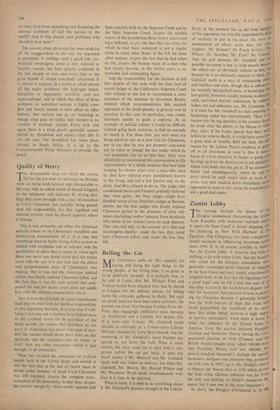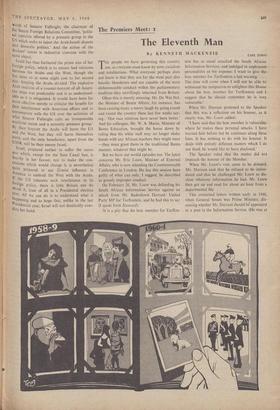Zionist. Lobby
THE 'passage through the Senate of the Douglas amendment threatening the United Arab Republic with economic reprisals unless, it opens the Suez Canal to Israeli shipping, an the picketing in New York Harbour of the Egyptian ship Cleopatra, are most conspicuou5 Israeli successes in influencing American action since 1956. It is, of course, possible to believe that the Zionist lobby in America had little nr nothing to do with either event, that the Senators who voted for the Douglas amendment were genuinely concerned about freedom of shiPPing in .the Suez Canal and were merely coincidentallY forgetful both of the fact that the Egyptians have a good legal case on the Canal ban and of all the other factors in the Arab-Israeli dispute; and that the Seafarers' International Union is picket' ing the Cleopatra because it genuinely believe that the Arab boycott of ships that trade with Israel jeopardised the livelihood of its melw hers. But either belief involves' a high degree of naIvety, particularly when there is borne lu mind the influence of the Zionist lobby in America from the auction between President Truman and Governor Dewey during the con' gressional election of 1946 (Truman said the British should straight away admit 100,000 Jews into Palestine, Dewey said 'not 100,000, several hundred thousand*); through the squalid backstairs intrigues and pressures that produced the UN vote in 1947; up to Mr. Dulles's refusal to finance the Aswan darn in 1956 which started the Suez crisis. (Zionist influence was far from the only one bearing on Dulles's disastrous de- cision, but it was one of the most important.) In short. the Douglas amendment is, ifl the words of Senator Fulbright, the chairman of the Senate Foreign Relations Committee, 'politi- cal coercion offered by a pressure group in the US which seeks to inject the Arab-Israeli dispute into domestic politics.' And the action of the dockers' union is industrial coercion with the same object.
Israel has thus furthered the prime aim of her foreign policy, which is to ensure bad relations between the Arabs and the West, though she has done so at some slight cost to her second aim—keeping the Arabs divided. The explosive Arab reaction of a counter-boycott of all Ameri- can ships was predictable and is as understand- able as it is misguided. It would have been far more effective merely to criticise the Israelis for their interference with American affairs and to commiserate with the US over the activities of What Senator Fulbright calls an 'irresponsible maritime union and a minority pressure group.' BY their boycott the Arabs will harm the US and the West, but they will harm themselves more, and the only beneficiary, apart from the USSR, will be their enemy Israel. Israel, prepared neither to suffer the status quo which, except for the Suez Canal ban, is heavily in her favour, nor to make the con- cessions which would change it, is nevertheless quite prepared to use Zionist influence in America to embroil the West with the Arabs. If the US tolerates such interference in its forei.n .6 policy, there is little Britain can do about it, least of all in a Presidental election Year. All we can do is to understand what is happening and to hope that, unlike in the last Presidential year, Israel will not drastically over- Play her hand.







































 Previous page
Previous page